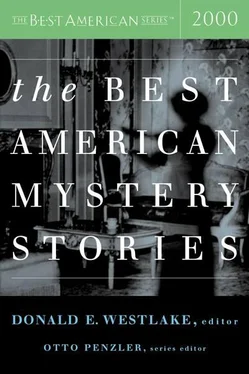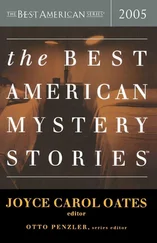Tom Franklinwon the 1999 Edgar Award for Best Mystery Story for his novella “Poachers,” the title piece of his first book, published in 1999. The novella also appeared in The Best American Mystery Stories 1999 and The Best American Mystery Stones of the Century. Franklin, from Dickinson, Alabama, now lives in Galesburg, Illinois, with his wife, the poet Beth Ann Fennelly. He is currently working on a novel, Hell at the Breech.
I worked at a plant very much like the one in “Grit” for over four years, frequently on the night shift, during my early twenties. Nowadays, when I tell people about the grit factory, they often think it’s grits, the kind you eat. I tell them no, no, it’s sandblasting grit. At the plant, I ran the front-end loader and the forklift, unloaded slag from railcars, and loaded hundred-pound bags (for which I’m still seeing a chiropractor).
“Grit” is dedicated to the great bunch of guys I knew there: my uncle. D Bradford, who got me the job; Steve Sheffield: Bryan Ward: Roy Simon: Robert Evans; and the plant manager. Jim Seidenfaden. Uncle D, Bryan, and Jim still work at the plant; Robert is out owing to a back injury; and Roy died a few years ago.
David Edgerley Gatesgrew up in Cambridge, Massachusetts. His earliest influences were Kipling and Stevenson, Puck of Pook’s Hill and Treasure Island, which his father read aloud to him, but what he first read on his own was the Hardy Boys mysteries and Carl Barks’s Donald Duck adventures in Walt Disney’s Comics & Stories. His short fiction has appeared in Alfred Hitchcock, A Matter of Crime, and Story. An earlier mystery featuring Placido Geist, “Sidewinder,” was a Shamus nominee for 1998. Gates lives in Santa Fe.
• “Compass Rose” is the fifth story I’ve written with Placido Geist. In the first story, he wasn’t even introduced until about a third of the way in, and I didn’t realize at the time he was going to be the hero. I underestimated him at first appearance, just like everybody else.
The ghost of Sam Peckinpah inhibits these bounty-hunter stories because of the period, and because I’m trying for an elegiac quality but without making it too obtrusive. Placido Geist is himself an unsentimental sort.
Robert Girardiis the author of three novels — Madeleine’s Ghost, The Pirate’s Daughter, and Vaporetto 13 — and one collection of novellas, A Vaudeville of Devils: Seven Moral Tales, from which the selection in this volume is drawn. He is a native of Washington, D.C., but spent a good portion of his youth in Europe, an experience reflected in the international settings of much of his fiction. He lives in Washington with his wife, the poet and mystery writer Linda Girardi, and their two children, Benjamin Oliver and Charlotte Rose. He can be reached at 1girardi@aol. com.
• I’ve always been amused by the various goofy ways there are to die, and to my mind falling out of or off of a building has always had an element of comic absurdity. I’ve also long wanted to write an anti-Grisham lawyer story in which the lawyer is not only incompetent but utterly mistaken regarding the guilt or innocence of his client — and I suppose from these two slightly ridiculous impulses “The Defenestration of Aba Sid” was born.
Chad Holleywas born and raised in Mississippi and received an MFA from the University of North Carolina at Greensboro in 1999. His stories have begun to appear in such places as the Chattahoochee Review and the Greensboro Review. He is currently working on a novel and a collection of stories.
• In one of her letters, Flannery O’Connor said something to the effect that too often the stories she fussed over least seemed to be the ones folks liked the most. I want to say that’s been true of “The Island in the River,” but then maybe it’s been long enough now that I’ve just forgotten the fussing. There is always fussing. The initial ingredients for this story were a terrible dream, a recent hunting trip, and the crackling vinyl soundtrack to Pat Garrett and Billy the Kid.
Ex-police officer, ex-army tank gunner, and ex-auto parts salesman, Edward Leeis the author of more than a dozen novels, most recently the police procedural Dahmer’s Not Dead (with Elizabeth Steffen), and the conspiracy thriller The Stickmen. Lee has also sold over sixty short stories in the horror and suspense field, plus a number of comic scripts. Currently he lives in Seattle, where he pursues a peculiar hobby: collecting crab shells.
• “ICU” actually went through several phases of revision over the past few years. I wanted to write something hard, fast, and dark, with a payoff ending, but something that also probed fairly deeply into the psyche of a sophisticated modern sociopath. I wanted the trimmings to be real: hence, via a stack of textbooks and some law enforcement journals, I did quite a bit of research involving the technical mechanics of child pornography. its statistics, its distribution, etc. I reworked the piece a number of times, avoiding telling the story from the antagonist’s point of view, which seemed too dark, but then I just said to hell with it and did it. Lastly, I tweaked the ending at the suggestion of editor Al Sarrantonio and was thrilled to have the piece published in Avon’s 999 .
Dennis Lehaneconsiders himself a short story writer who somehow fell into writing novels. He has written five crime novels, including Gone, Baby, Gone and Prayers for Rain, with the Boston private detectives Patrick Kenzie and Angela Gennaro as the lead characters. His next novel, Mystic River, is his first novel not of that series. He lives in Boston with his wife, Sheila, and their two bulldogs, Marlon and Stella.
• I went to college in Florida, and usually I’d drive to or from Boston at the beginning and end of the school year. Sometimes I’d take I-95, and other times I’d spend four or five days driving the back roads through Georgia, the Carolinas, Virginia, and Delaware. For some reason, every time I passed through the Carolinas, the roads were littered with what seemed like a prodigious number of dog corpses. I’ve never discovered any logical reasons for this, but just the same, time and time again. I’d drive through the Carolinas and see several dead dogs. It stuck in my head, and when I was in graduate school I wrote an early draft of “Running Out of Dog” that was solely about a guy who worries that his best friend has become one of those men who may one day walk into a place of business with a loaded rifle and kill everyone he sees. Five years later, I dusted the story off and decided to open it up. I added several characters (as well as twenty-five manuscript pages), changed the time in which the story was set, and created a far more ambiguous ending. What stayed the same was the basic idea — a guy who shoots dogs for a living and gets an unhealthy taste for it — and the tide. Like all my stories, I’m not sure how I feel about it, but it’s my wife’s favorite. My dogs, however, hate it.
A native of Houston, Texas, Thomas H. McNeelyhas recently received fellowships from the MacDowell Colony and the J. Frank Dobie Memorial Project at the University of Texas at Austin. “Sheep” is his first published work of fiction. He teaches at the Grub Street Writers’ Workshops and Emerson College in Boston, where he is currently at work on a collection of linked stories.
• The idea for “Sheep” came to me while I was working for a nonprofit law firm in Texas that defended death row cases. At the time, I spent many hours looking at crime scene photos and many hours with the men who committed those crimes. I was struck by my inability to connect what I saw in those pictures with the men I came to know. That moment, and the comparisons it suggested to me about the criminal justice system’s inability to consider how the men they sought to execute came to be who they were, formed the kernel of the story.
Читать дальше












